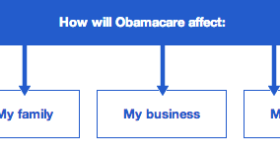Second Opinion is a weekly Q-and-A series that answers questions from San Diegans on the Affordable Care Act. Ask yours here.
The Question: Is it cheaper to pay the fine than to buy coverage for an individual?
Toby Hayes is a San Diego banking executive. His office is decorated with photo collages of his six young children and wife.
As his family has grown over the years, so have his expenses. Next year presents a major financial challenge: He has to start paying down his student loans at the same time the Affordable Care Act will require him to take out an insurance policy for his wife, who is currently uninsured.
Here's Hayes' question:
"My question is, I have six children in my household and [we're] covered by insurance by my employer. My wife, who stays home with our children, is not covered. What would the penalty be if we opt to not get coverage for my wife next year?"
The Takeaway: The fine is often cheaper, but it depends on your income.
Obamacare requires all individuals to have health coverage next year or pay a penalty. The rule is often called the "individual mandate," but the federal government prefers "individual shared responsibility provision," a subtle reminder that the new insurance policies will only work if enough healthy people pay into them.
But there are some exceptions to the provision:
- Individuals who can't find plans costing within 8 percent of their incomes
- People who make so little they don't file taxes
- Individuals with a coverage gap of three or fewer months
- People who don't have legal immigration status
- Indian tribal members and their dependents
- Members of certain religious sects or health care sharing ministries
- Individuals who are incarcerated
If individuals don't qualify for an exemption, they'll have to pay $95 or 1 percent of their income, whichever is more, when filing their 2014 taxes. The fine increases to $695 or 2.5 percent in 2016.
Whether those figures are cheaper than buying health insurance depends a lot on income and household size. If Hayes makes $55,000 to support his family of eight, his wife qualifies for substantial subsidies on the Covered California insurance exchange. Annually, he could pay as little as $1,032 to cover her. By 2016 the fine for Hayes would cost $1,375.
But as income increases, subsidies decrease and the annual cost of insurance slowly ticks above the cost of paying the fine.
How exactly do you pay the fine? It will be folded into your tax filings beginning with tax year 2014.
The Orders: Know all the rules.
Here's an important reminder if you're thinking about skirting the individual mandate: You can't necessarily enroll once you become sick.
Yes, the law says insurance companies can't withhold coverage because of pre-existing conditions, but you can only get insurance during open enrollment periods. In other words, if you get sick in April, you could have to wait until October to get coverage.
And a rule of thumb: Explore all of your options before deciding to take the penalty rather than buy the insurance. The Affordable Care Act has extended access to affordable coverage in ways many people might not expect.
If Hayes makes just $1,000 less than the example used above — so $54,000 — his family would qualify for Medi-Cal, which is significantly cheaper than paying the fine.
Check out last week's Second Opinion: How Do College Students Fit Into The Obamacare Exchanges?









